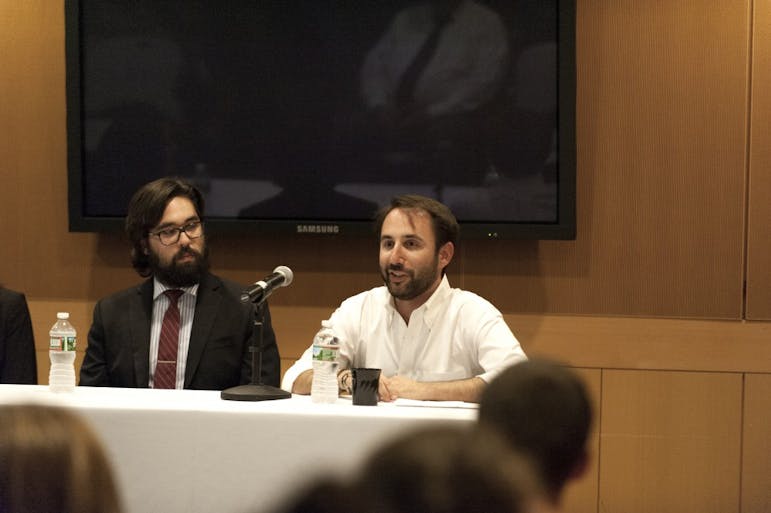Politics alumni return to discuss their career paths

ADVICE: Ethan Lustig-Elgrably ’12 and Michael Carlin ’97 spoke to students about their transitions into the work world.
College is the first step into entering the adult world, but many college students are unsure what exactly lies beyond it. In order to address this issue, Prof. Eva Bellin (POL) and the Politics department hosted an alumni panel last Wednesday.
Despite all having graduated from the University with a major in Politics, the three alumni followed vastly different career paths and now lead very different lives. Michael Carlin ’97 is senior vice president of international media and planning at Warner Bros Pictures. Lisa Cloutier ’02 works at the Office of Civil Rights in the U.S. Department of Education, and Ethan Lustig-Elgrably ’12 is chief of staff at the Office of New York City Council Member Mark Treyger.
To find a satisfying career, Carlin advised students that “finding something you can be really passionate about [is] absolutely critical.” Carlin intended to be a journalist, but the itinerant style of 1990s reporting didn’t suit him. Instead, he began working for an advertising agency, and he now markets Warner Brothers films around the world.
Carlin’s job requires an understanding of international politics and various cultures — what works in one country may flop in another, and a shifting media landscape provides constant new challenges. The job keeps Carlin interested, and he told the audience that he enjoys the accompanying lifestyle; he claims both interest and enjoyment are crucial to success in any career. The job plays to his strengths and interests, so his day-to-day life is enjoyable, despite not being what he once envisioned.
Cloutier’s career, on the other hand, matches perfectly with what she’d always envisioned. She said that she has always been interested in civil rights and social justice and had wanted to be a lawyer since age 12. A year after law school, however, she took a job doing “complex commercial litigation” for an international law firm. The job decision was financial, and Cloutier hoped to eventually make her way back to her passions.
Four and a half years later, Cloutier quit the firm. It was a leap of faith — she left without a new job lined up and traveled for six months. She said the move “intuitively felt right” despite going against “conventional wisdom” and the guidance of her Harvard Law School advisors.
Cloutier was well prepared for a switch. She avoided building an expensive corporate lifestyle, unlike many people she knew in law school. “So many people just sort of get stuck, they get used to making that paycheck,” she said.
Similarly, Lustig-Elgrably avoided getting stuck by following his passions directly after college. He knew he wanted to get involved in politics, and by the August after his University graduation, he was working on a Congressional campaign.
For Lustig-Elgrably, relationship building was everything. He sent in resumes for his first two jobs, however, once he became known in New York City’s political circles, he was referred from job to job, with his bosses recommending him to other politicians until he found his current position.
“Things sort of just fell into place,” said Lustig-Elgrably. To Brandeis students hoping to follow in his footsteps, he recommended getting involved in local politics first. Rather than go to New York or Washington with the hope of becoming a big name, it is better to become well known in local government and move up the ranks with some credibility, he said.
During a question-and-answer session, a Brandeis senior asked the panelists a critical question: “How have you all leveraged your Politics majors within your career paths?” Lustig-Elgrably asserted that, while his politics knowledge is helpful, he draws more from his anthropology major. He continued by saying that the writing and critical thinking skills he gained at the University have been crucial.
The other panelists agreed. Cloutier told students to “develop your writing skills. That’ll get you really far.”
When asked about the transition from Brandeis into the working world, panelists advised that not all experience can be gained in a classroom.
Carlin, for example, will not hire someone who’s never had office experience.
“Workplace etiquette is different from college etiquette, and many former students have trouble accepting that results are more important than effort in a job,” he concluded.
Despite having left the University, all three panelists agreed that they have remained thankful to their former school and returned to speak on the panel out of courtesy.
Bellin closed the panel by imploring students to value community and “remain engaged.” She added that when she calls up current students in ten years and asks them to come back and speak on campus, she hopes they will say yes.



Please note All comments are eligible for publication in The Justice.